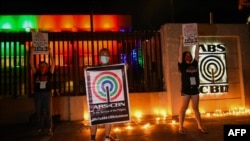The sudden shutdown of a 74-year-old Philippine broadcast network marks the Southeast Asian country’s second legal action this year against a media outlet that had challenged the president, deepening worries about media freedom.
Manila’s National Telecommunications Commission ordered May 5 that ABS-CBN quit operating radio and television stations in the capital, the network said on its news website. It was further ordered to take four regional stations off the air, the network said.
ABS-CBN’s franchise agreement had expired May 4, during a long shutdown due to the COVID-19 outbreak, despite efforts by the network to get a congressional nod for renewal.
The government of President Rodrigo Duterte disputed terms of the renewal. Duterte felt that the network had “swindled” him by what he described as not airing ads for his 2016 national election campaign, ABS-CBN reported on its news website.
“I think it’s terrible,” said Herbie Gomez, editor of the Gold Star Daily news website in the Philippine city Cagayan de Oro. “It’s one of the biggest TV networks in the country. The shutdown left a void. There are other networks, but ABS-CBN is different. I think what happened was the reporting of the network really angered the president.”
A report on the network’s website Monday, for example, says the Philippines “ranks poorly in fight vs COVID” with an unusually high death rate.
Filipinos see the network as a source of independently reported news rather than repetition of official statements.
In a second media flap this year, a Manila Regional Trial Court branch is wrapping up a cyber-libel case against the domestic online media outlet Rappler, its Chief Executive Officer Maria Ressa and a former researcher-writer. Rappler frequently publishes reports critical of the military and Duterte’s anti-drug campaign.
The two cases show that Duterte has “weaponized” the law to go after media outlets, Gomez said. The Philippines as a democracy formally allows freedom of speech and broadcast.
ABS-CBN’s Manila headquarters did not answer phones last week or over the weekend.
The National Telecommunication Commission denied ABS-CBN “due process,” said Renato Reyes, secretary general of the Manila-based Bagong Alyansang Makabayan alliance of leftist political organizations.
The network says on its website that the commission apologized to the House of Representatives for not notifying it of the shutdown. Congress is considering a bill to extend the franchise through October among other legislation that would keep it on-air, it says. Duterte allies control the Senate, which is studying some of the bills.
The shutdown “comes at the worst possible time,” Reyes said. “There’s a pandemic. You’re going to create a lot of jobless people. It’s the last thing we need now, a suppression of press freedom,” he said.
ABS-CBN had been “playing an absolutely crucial role” in informing the Philippines’ rural audience about the coronavirus spread, said Daniel Bastard [cq], head of the advocacy group Reporters Without Borders’ Asia-Pacific desk.
Much of the country is shut down as virus caseloads stand at about 12,500 with more than 800 dead. If the network stops for good, he said, it shows that “media pluralism has been reduced to Marcos levels.”
ABS-CBN was last shut down in 1972 after ex-president Ferdinand Marcos declared martial law and resurfaced only in 1986. The network reported mid-2019 revenue of 23.3 billion pesos ($458 million).
“Basically the way the Duterte Administration deals with the media shows that the president’s faction just doesn’t tolerate independent or critical journalism and this is a reminder of the darkest hours of the Philippines in times of dictatorship,” the advocacy group official said.




